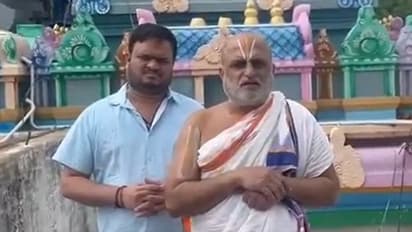'Don't destroy minority rights in Bangladesh': Chilkur Balaji Temple priest's message to US Deep State (WATCH)

Synopsis
CS Rangarajan, the Archaka of Chilkur Balaji Devasthanam, has publicly appealed to the United States' Deep State to refrain from meddling in the Bangladesh crisis.
In a significant intervention amid the ongoing political turmoil in Bangladesh, CS Rangarajan, the Archaka of Chilkur Balaji Devasthanam, has publicly appealed to the United States' Deep State to refrain from meddling in the crisis. The Chilkur Balaji Temple, a revered site for devotees, has become a focal point of this appeal, as Rangarajan underscores the urgency of preserving Dharmic values and the rights of minorities in Bangladesh.
"Since morning today we have been addressing the devotees and expressing huge concern about the American Deep State involvement in Bangladesh crisis. Chilkur Balaji devotees are all there in the US. They have to pressurize the US government because what Chilkur Balaji represents - he represents the protector of Dharma in this land of Dharmic civilization," he said in a video appeal.
He further said, "Bhoomata represents the Bharata Mata, which was partitioned with the guarantee that the freedom of worship will be provided in unpartitioned Pakistan and unpartitioned Bangladesh. Unfortunately, the situation is becoming worse everyday. I am requesting all the like-minded people - in fact we are calling religious leaders to put pressure on Deep State in America so that they don't interfere and destroy minority rights in Bangladesh which is in terrible crisis."
Rangarajan's call comes in the wake of escalating tensions in Bangladesh, where domestic politics, international influence, and personal rivalries are reportedly fueling a volatile situation.
The political landscape in Bangladesh has become increasingly complex, with allegations of foreign interference complicating the situation. Ousted PM Sheikh Hasina recently accused the United States of orchestrating her removal from power, citing her refusal to allow the establishment of a US military base on St Martin's Island, a strategically important location in the Bay of Bengal. This refusal, Hasina claimed, led to destabilizing actions within her country, including the anti-quota student protests she believes were designed to undermine her government.
The term "Deep State" refers to a clandestine network of powerful individuals or groups within the government or military who operate independently of elected officials to influence policy and decision-making for their own agendas. Observers have suggested that the US Deep State may be involved in the political upheaval in Bangladesh, with the interim government, under the leadership of Nobel laureate Muhammad Yunus, perceived as pro-US.
Yunus is known for his global contributions to microfinance through the Grameen Bank. His strong ties to US organizations such as USAID and the Ford Foundation have also raised suspicions about his alignment with US interests. The Ford Foundation, in particular, is under scrutiny by Indian authorities for allegedly promoting anti-India sentiments.
Yunus’s recent political moves have further strained relations with Hasina. His suggestion to form a new political party was seen as a direct challenge to Hasina's leadership. Hasina has also accused Yunus of unethical practices, including the alleged diversion of $100 million from Grameen Bank to a sister organization in violation of Bangladesh's financial laws.
The US's push for a military base on St Martin’s Island has been a major point of contention. Hasina's refusal to lease the island has strained relations, with the US reportedly aiming to control the Bay of Bengal and counter China's influence in the Malacca Strait, a critical global shipping route. Hasina’s rejection of the US proposal was a significant factor in the deteriorating bilateral ties.
Hasina has accused the US of attempting to carve out a "Christian country" from parts of Bangladesh and Myanmar. She claimed that a "white man" had assured her of no election problems if she allowed the US to build a base on Bangladeshi territory.
The political upheaval has not only drawn attention to the US's role but has also highlighted the involvement of other international actors. On August 2, 2024, 22 US senators sent a letter to Secretary of State Antony Blinken urging action against Hasina’s regime. Among the signatories was Ilhan Omar, known for her critical stance on Pakistan.
The role of the opposition Bangladesh Nationalist Party (BNP) and Pakistan’s intelligence agency, ISI, has also been scrutinized. The ISI is alleged to have collaborated with BNP vice-chairman Tarique Rahman, based in London, to incite unrest. Rahman’s provocative social media posts and alleged meetings with ISI officials have added another layer of complexity to the situation.
Student protests, particularly those involving BRAC University students, have been linked to various international organizations. BRAC University’s involvement with the Open Society University Network (OSUN) and the funding received from George Soros’s Open Society Foundations (OSF) have fueled suspicions of foreign influence. OSF’s support for displaced Rohingya refugees and other initiatives in Bangladesh and India has been controversial.
Stay updated with the Breaking News Today and Latest News from across India and around the world. Get real-time updates, in-depth analysis, and comprehensive coverage of India News, World News, Indian Defence News, Kerala News, and Karnataka News. From politics to current affairs, follow every major story as it unfolds. Get real-time updates from IMD on major cities weather forecasts, including Rain alerts, Cyclone warnings, and temperature trends. Download the Asianet News Official App from the Android Play Store and iPhone App Store for accurate and timely news updates anytime, anywhere.